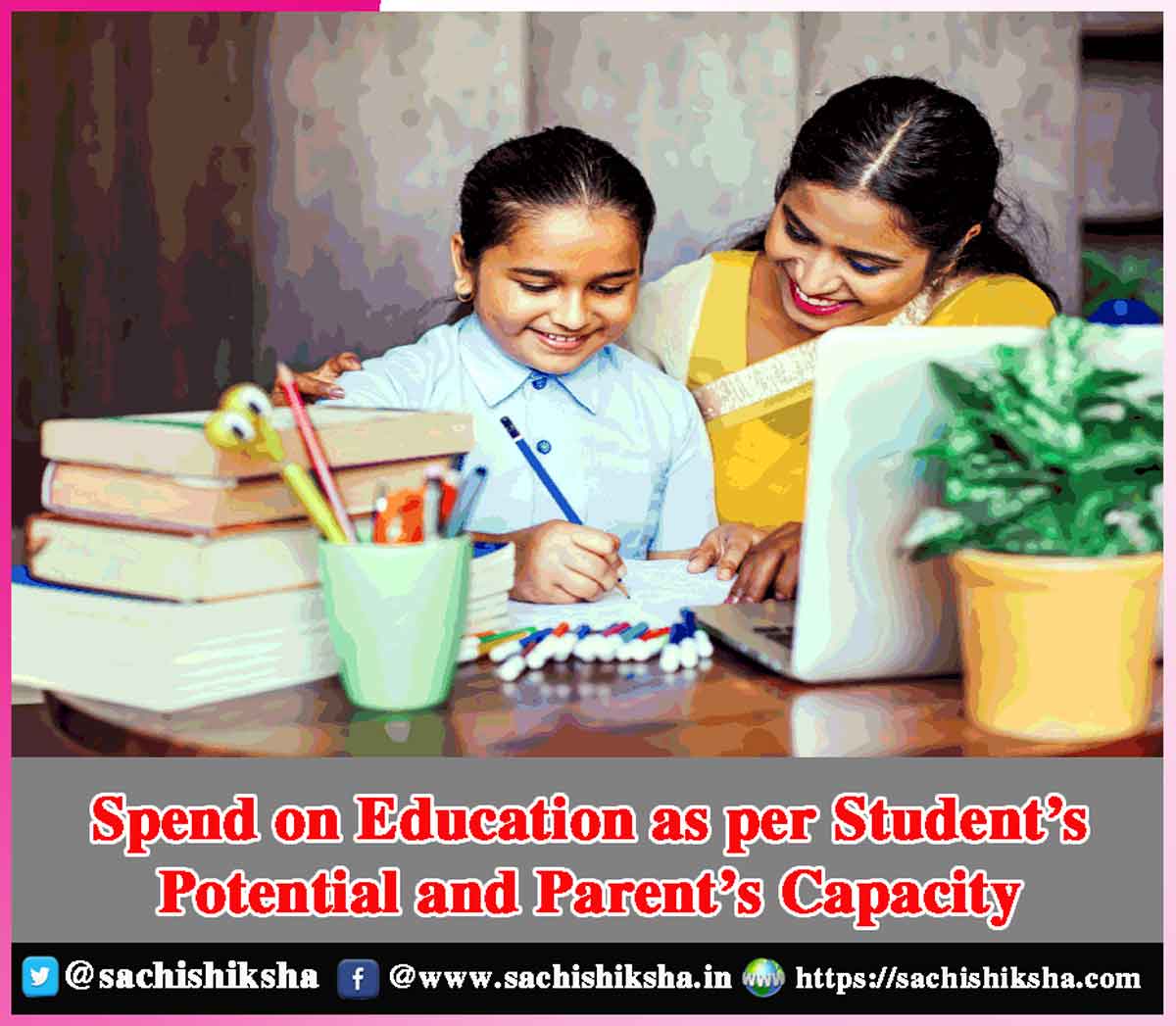Spend on Education as per Student’s Potential and Parent’s Capacity
Table of Contents
Fundamental Motive of Education
The word ‘Education’, coined from a Latin word, in its most literal term means to teach, learn, or develop oneself. Transmission of knowledge is the fundamental motive behind any educational curriculum, system, or pattern. At the student level, the development through education could be in terms of personality, skill, character, intellect, or a sum of all these.
Considering broader outreach, education plays a crucial role in the socio-economic development of any country as it generates the most valuable resource which is “human resource”, which harnesses other resources for creating processes, products, and services.
Educational Expenses

Furthermore, the college fee can be expected to cost an arm and a leg. But the educational expenses do not cease here. Another educational sector that has acquired immense popularity over the years is the coaching institutes. The fee of any coaching institute for any particular class is almost equivalent to its counterpart in school, or sometimes even greater than that for cracking any competitive exam like JEE, NEET, UPSC, etc. Recently, another spearheading trend of taking foreign education has captivated learners. Cost of studying abroad can cost roughly around 10 to 50 lakhs depending upon the country and the university.
Rat Race for Branded Educational Institutes
Today, branding in education has changed the scenario completely. Most parents, whether elite or middle class want their children to study in only branded schools or colleges equipped with the best infrastructural facilities. And they are ready to pay a handsome fee for this. Earlier, there were limited options for students, and the preferences were based on actual pedagogical techniques. But today, the name game is the most influencing factor. Fancy or branded schools are at the top of the game.
Previously, only meritorious students used to opt for foreign education and that too with the aid of scholarships offered by universities after clearing their respective entrance tests. But nowadays, average or below-average students who are unable to grab desired courses in Indian colleges or universities, are keener to opt for foreign education with paid seats. Foreign education has now become fashionable.
Eventually, around 65% of parents spend a huge chunk of their yearly earnings on educating their children. Definitely, investment in education is worthy as it makes a person skilled, confident, open-minded, and more valuable. But, here, the striking question is how much spending is enough and when it becomes too much as the status quo of education is surrounded by many ambiguities. Towering fees, though troublesome for many parents, are now being accepted by them, as it’s a new status norm.
Gradually, the parents have become more anxious for their child’s career and they are spending exorbitantly for that. Even, in some cases they are more attracted by the branded school or colleges in contrast with the children. The parents are getting more trapped in the net of a fancy education system. Over apprehensive parents want their children to study in the best school or college and ensure future success. But, does such excessive spending assure a complete job guarantee? Some recent facts reveal that many engineering students of IITs are jobless.
Lack of Quality Education
It is believed that education opens the doors to knowledge and wisdom. It not only literates a person but also helps in upgrading his character. But when the selection of school, college, or university becomes only a matter of pride and status, the essence of education sluggishly gets lost in the extravaganza. It is evident through many examples that high-fee courses run by private institutes are unable to provide employment.
Despite excessive spending on studies, students lack quality education. The students after acquiring degrees from high-fee colleges expect high-earning jobs and when the expectations do not get actualized, they feel dissatisfied and depressed. Also, excessive spending on education can disrupt the financial stability of a household. Sometimes, middle-class parents have to take huge loans to pay high fees.
Conclusion
The main aim of any education system is to transform a person by making him more aware, an efficient decision-maker, self-sufficient, and adaptive to future life challenges. But for achieving these attributes, experience-based learning that is informal education is inevitable and excessive spending on education is not necessarily required. Extravagant education is not the only indicator of success in life. Students of standard schools or colleges can also be very successful through a holistic development approach. Thus, here, the decision solely depends on the parents and their children.
They should act wisely and the selection of any education institution should be based on the student’s potential and parent’s capacity to pay rather than just following any status norms. If the parents are economically sound then they can surely go for bearable outlay but middle-class parents should act mindfully and should not get involved in any cat race. More importantly, a healthy and transparent discussion between parents and children regarding their spending abilities and competencies, respectively, can definitely help in the selection of most appropriate school or college. In such a way, education-related decisions can be worthy for the parents and the students.















































